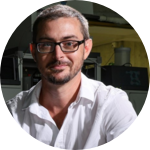About This Project
Microplastic analysis is a very time-consuming procedure while smaller-sized plastics (<300 microns) can mostly not be detected with the methodology applied such as FTIR. To speed up the data analysis and detect microplastics down to a size of 20 microns we aim with this project to provide an open-science laboratory protocol suited for high throughput microplastic analysis with a Laser Directed Infrared Imaging system (LDIR).
Ask the Scientists
Join The DiscussionWhat is the context of this research?
Today, we have very little knowledge about smaller-sized microplastics (<300 microns) and their impact on the environment. Current data analysis for small microplastics is very time-consuming, sometimes taking months to observe using (FTIR). With high throughput LDIR analysis, which will observe particles down to 20 microns, it will be possible to collect data on microplastics in a matter of hours. In addition, it will also allow us to perform a complete analysis of the collected samples and not only a partial analysis which has been the standard used by most researchers due to time constraints.
What is the significance of this project?
The analysis of smaller-sized plastics is very time-consuming and can mostly not be detected with the methodology applied such as FTIR. With the LDIR system, we will be able to analyze microplastics with sizes down to 20 microns, in a high-throughput fashion (up to about 750 particles can be measured within hours instead of weeks!). With this approach, we avoid the problem that data is always published much too late (years later!) and we are lagging behind with numbers that are being needed now! To do so, an open-source laboratory protocol will be developed to provide the scientific community with new methods to work with the LDIR system for smaller-sized microplastics.
What are the goals of the project?
The goal of the project is to elaborate a new open-source high-throughput laboratory protocol for the LDIR system, based on existing LDIR protocols for plastic analysis by testing different parameters for the organic material digestion (e.g. peroxide, base/acid, or enzymes) and different LDIR settings to analyze particles from 5mm-20 microns at once. This will speed up the study and will allow complete analysis of the collected samples. as opposed to normal analysis using FTIR, which takes up to months, with only about 10-20% of the collected samples being analyzed. The protocol will be published in a scientific journal and on our website to make it available to everyone.
Budget
The crowdsourced budget has been arranged to cover the costs of the different laboratory expenses (650 USD, including glass slides, jars, solutions, etc.)as well as the price of the usage of the LDIR (2500 USD, 20 USD/hour). This budget also aims to provide financial support for a Master’s student intern working on this project. We have all the necessary people and infrastructure at EPFL to ensure the coordination of the research as well as the appropriate usage of the different products and machines.
Endorsed by
 Project Timeline
Project Timeline
- May, 2022: Project launched
- June 2022: Microplastic sample collection in the Mediterranean Sea
- July-November 2022: Sample preparation, (digestion of organic material, sieving, sample preparation for the LDIR system)
- December 2022: Establishment of a high-throughput sample analysis protocol using the LDIR system and measurement of all samples
- January 2023: Manuscript preparation
- Early 2023: Paper submission
Jun 30, 2022
Sample collection in the Mediterranean Se
Oct 28, 2022
Project Launched
Nov 30, 2022
Sample preparation, (digestion of organic material, sieving etc.)
Dec 23, 2022
Establishment of a high-throughput sample analysis protocol using LDIR and measurements of all samples
Jan 31, 2023
Manuscript preparation
Meet the Team
Team Bio
Roman Lehner
Roman is the co-founder and scientific project leader of the sail & explore association. He did research on the topic of micro- and nanoplastics and their possible impacts on human health at the Adolphe Merkle Institute in Fribourg, Switzerland. He designed a worldwide first human 3D in vitro intestinal model to assess the possible adverse effects of ingested microplastics such as inflammatory responses. Furthermore, he is performing the world’s first study on the effects on human immune cells when exposed to environmentally relevant microplastics. In addition, he is researching on the production of nanoplastic particles that can be used as first marker particles allowing the investigation of possible adverse effects and cellular interactions. In addition, he is leading scientific sailing expeditions on the topic of microplastics for sail & explore.
Killian Zurita
Since early childhood, I have been fascinated by nature and humbled by the complexity of life on earth. During my studies, I have developed great interest for actual technologies (such as transcriptomics & eDNA) with their ability to display information about species community structure and health. During my Master's Internship at Sail&Explore, I have developed the seem feeling of excitement towards the LDIR system and its great precision reading glass plates with microplastics sizes down to 20 microns.
Additional Information
Project Backers
- 6Backers
- 100%Funded
- $4,650Total Donations
- $775.00Average Donation



